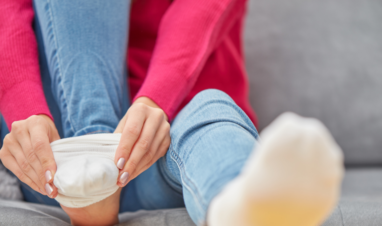October is Raynaud’s Awareness Month
At Caring Podiatry, we want our Monroe, Neptune, Monmouth, and Middlesex County patients to be informed about this condition. If you’re like many people with undiagnosed Raynaud’s you may think that your cold feet and hands are normal, especially now as the temperatures drop. Frequently feeling cold—particularly when others around you are not—is one sign of Raynaud’s. Other symptoms include:
Fingers that turn white, blue, or red when exposed to cold
Holding a cold object or reaching into the freezer actually causes pain
Your toes and fingers begin to go numb, hurt or change colors when you are in a stressful situation
Raynaud’s is a medical condition characterized by spasms in the blood vessels that interrupt blood flow to your toes, fingers, ears, and nose. It causes the extreme reaction to the cold. Winter temperatures can make Raynaud’s worse. If you are suffering with any of the above symptoms, you should discuss them with our podiatrists, Andrew Schmierer, Craig Shapero, Mark Fillari and Eric Peters.
Far From Rare
Although often categorized as “rare,” Raynaud’s is more common than most people think. It’s estimated that between 15 and 30 million people, or up to 10% of the population have Raynaud’s. It effects 20% of all women of childbearing age and more people than MS, Parkinson’s and leukemia combined.
Sometimes Raynaud’s occurs on its own—known as Primary Raynaud’s. It can also be associated with other diseases or conditions—known as Secondary Raynaud’s. Doctors aren’t completely sure what causes Raynaud’s. It may be linked to certain autoimmune diseases, damage to blood vessels caused by trauma or repetitive actions or circulation issues. Smoking, which already decreases circulation, may be a factor.
Treatment
There is no cure for Raynaud’s, so treatment is usually focused on decreasing the number and severity of attacks. Wearing extra layers on hands and feet and avoiding very cold settings for starters. Other options include:
Asking the doctor or pharmacist to evaluate the medications you take as some of them have links to attacks
Quit smoking
Find new and better ways of coping with stress
There are some medications available to help dilate the blood vessels in the feet like 16% Nifedipine cream and other drugs that, while not specifically approved for Raynaud’s, have proven to be effective in treatment. There are also procedures that destroy the nerves that trigger blood vessel narrowing in the affected areas.
If you have questions about Raynaud’s or suspect you may have it, contact us at our Monroe Township (609-860-9111) or Neptune (732-455-8700) offices for an appointment.

